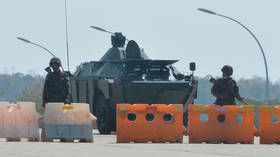Myanmar’s military coup is no surprise. Democracy there was built on very weak foundations and always destined to fail

Aung San Suu Kyi’s inability to retain control of Myanmar should shock no one. The army has always wielded excessive influence in the country and deep ethnic divisions mean it doesn’t have the stability to support democracy.
On Monday morning, the military of Myanmar effectively declared a coup by arresting the country’s civilian leaders, including State Counsellor Aung San Suu Kyi, and announcing a one-year state of emergency.
The sudden move, which has been condemned by Western powers including the United States, brings to an end a brief period of democracy in the South-East Asian nation spanning the past five years and reaffirms the military’s traditional power over the state, with the army accusing last November’s election results of being fraudulent.
Seasoned Myanmar observers will not see this development as a surprise. Since its independence from British rule in 1948, this is a country that has been beset by chaos, and marred by weak institutional structures and inter-ethnic conflict that have only been partially patched together by its military.
Put simply, the democratic experiment has failed, as the state does not have the underlying stability for it to work in practice. From here, we should expect immediate confrontation between the new junta and the West, with the Joe Biden administration almost certain to exert pressure against it. This will, in turn, increase its reliance on China – a scenario which preceding administrations have sought to undo.
The woes of Myanmar – or Burma, as it was previously known – can be directly traced back to the legacy of British rule over the country prior to the 1940s. In the 19th century, the British gradually conquered the Burmese dynasty of Konbaung and incorporated it as part of India, not granting it separate status until the 1930s.
As was the case with many post-Imperial countries throughout the world, the British replaced traditional forms of government with a colonial nation state model, often with artificially imposed borders which negligently painted over numerous ethnic and religious divisions. The British called the colony Burma after the predominant ethnic group within it – but not the only one.
As a result, the independence of Burma created a state with weak institutions and a fragile local legitimacy which was unable to reconcile the different groups who lived there.
This had two consequences: firstly, the military became its most politically influential institution, as it was the only means by which the state could be held together. Secondly, this influence, and the divisions within the country, has created longstanding ethnic conflict.
This has included a war between the Karen minority group and the central government since 1949, and then more recently the Rohingya conflict, whereby the military have clashed with the minority Muslim group and subsequently been accused of genocide, with thousands fleeing to neighbouring Bangladesh.
Given all this, it is little surprise that the military have seized power and aborted the country’s attempt at full democracy. They have always had more influence than its civilian leaders. The US and its allies had long encouraged democratic transition in Myanmar, and the election of Aung San Suu Kyi in 2015 was acclaimed as a new beginning for the country, with Barack Obama’s administration lifting sanctions.
Also on rt.com US demands Myanmar’s military immediately reverse its takeover, as Rohingya community calls for democracy to be restoredHowever, democracies are not built on theory and hope alone; those who prop them up ought to have a stake in the system in order to sustain it and grant legitimacy to the democratic process. Myanmar’s divided and uneven society was ill-suited for such a task, and so the country has reverted back to the old status quo.
As a result, it is likely that the Biden administration will move quickly to reimpose unilateral sanctions on Myanmar in an attempt to force it back on to the ‘right path’. US foreign policy makers hoped that a successful democratic experiment in the country would ultimately help steer it away from China. But that transition was put on ice as the Rohingya crisis developed, and now, with the coup, it has been ended completely.
The country’s military are, not surprisingly, very pro-Beijing, and Myanmar’s inevitable alienation from the West will thus consolidate its reliance on China, especially in terms of trade and investment.
Yet this is not so much a grand strategic plan from either side, as it is the consequence of a country that has struggled to find basic stability since its modern existence. Military rule has always held this broken nation together, and attracted great disapproval in the process.
Think your friends would be interested? Share this story!
The statements, views and opinions expressed in this column are solely those of the author and do not necessarily represent those of RT.














